New data from ABTA – the Travel Association – reveals that the UK’s outbound travel sector contributed £51.6 billion to the national economy in 2023, marking a 5% increase from 2019, when the sector’s contribution stood at £49 billion. This growth underscores the pivotal role that outbound tourism plays in the UK economy, supporting 818,000 jobs across the country.
ABTA emphasizes that with the right policies, the travel sector has the potential to contribute even more significantly to the government’s economic growth targets. However, the association also expressed concerns that the industry’s expansion may be at risk without an appropriate policy framework.
ABTA pointed to financial challenges facing the sector, including rising employment costs from employer national insurance hikes, and a forthcoming 14% increase in Air Passenger Duty for short-haul economy flights, which will add £12 to the cost of long-haul economy flights starting in April 2026. These issues are raising concerns about consumer and business confidence, particularly in light of the recent UK Budget.
Key Policy Areas for Collaboration
In response, ABTA has called for collaboration with the government to unlock the full potential of the travel industry. The association’s key policy recommendations include:
Decarbonisation of Aviation and Cruising: ABTA stresses the importance of policies that support the environmental sustainability of aviation and cruising, without pricing out consumers from travel opportunities.
Reforming Business Rates: ABTA proposes reforms to business rates that better reflect the value of high street businesses, helping travel agents and other travel-related businesses that operate from physical locations.
Enhanced EU Trading Arrangements: ABTA advocates for improved trading agreements with the EU, especially to reinstate a youth mobility agreement that would allow UK nationals to work in temporary tourism positions abroad, boosting the industry’s labor force.
Mark Tanzer, Chief Executive of ABTA, commented: “The new Government has placed delivering growth at the top of its agenda, and today’s figures clearly show that travel can play a leading role in stimulating the growth we all want to see. Communities across the country are benefiting from the revenue and jobs generated by outbound travel, and we want that to continue.”
Tanzer acknowledged the resilience of the travel sector despite the challenges posed by the pandemic and the ongoing cost-of-living crisis. However, he emphasized that travel businesses face notable obstacles, including increasing costs and changes to travel to the EU, which remains a key destination for UK holidaymakers.
Tanzer concluded: “Whilst we should celebrate our successes, we cannot take our future growth for granted. With the right tax and policy framework, the travel industry can continue to drive economic growth and support the government’s ambitions.”
The findings were unveiled at ABTA’s Travel Matters event in Westminster, with a full report due for release in early 2025.
Related topics:
- Tourism Revival: China’s Visa-Free Policy Drives Global Connections
- China Enforces Passport Surrender Policy for Teachers in a Bid to Tighten Control Over Foreign Travel
- ACT-Wazalendo Urges Withdrawal of Zanzibar’s Mandatory Travel Insurance Policy

